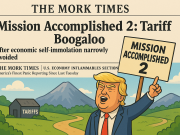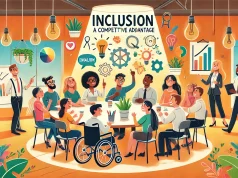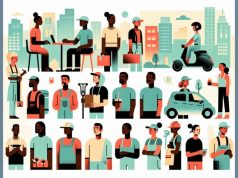The gig economy, characterized by its flexible work arrangements and freelance opportunities, has experienced explosive growth over the past decade. But beneath the allure of entrepreneurial freedom and on-demand gigs lies a web of intersectional challenges faced by the workforce. These challenges are particularly acute for those who navigate the employment landscape with identities intersecting race, gender, sexual orientation, and disability.
In the world of short-term contracts and independent project-based work, the promise of inclusivity and equal opportunity often falls short. For instance, gig workers from racial minorities may face discriminatory biases that impact their ability to secure work or demand fair pay. Women, especially women of color, might encounter a compounded effect of gender and racial discrimination impacting their professional experiences and earnings in the gig sector. Moreover, the LGBTQ+ community and individuals with disabilities may confront both overt and subtle forms of exclusion and marginalization, which are rarely addressed by gig economy platforms.
The structural inequities embedded within the gig economy can be seen in the algorithms that drive demand, the rating systems that influence worker credibility, and the lack of social security benefits that places an additional burden on marginalized individuals. Unlike traditional employment, gig work rarely offers a safety net, leaving workers to fend for themselves in times of illness, disability, or economic downturns.
An analysis of the existing barriers reveals a troubling trend: gig economy platforms, while revolutionary in their approach to flexible work, can inadvertently amplify systemic biases. A rating system, for example, might perpetuate racial stereotypes if customers rate workers of color lower based on deep-seated prejudices. Furthermore, the lack of comprehensive anti-discrimination policies or enforcement mechanisms within these digital platforms allows biases to go unchecked.
However, the gig economy also has the potential to be a space of progressive change. Gig platforms and policymakers alike can play a significant role in crafting an environment that fosters equity and inclusion. Strategies to consider include anonymizing profiles during the hiring process to prevent initial bias, implementing and enforcing anti-discrimination policies, and providing sensitivity training for both workers and consumers. Additionally, advocating for policy reforms that guarantee basic worker rights, like minimum wage guarantees and access to health insurance, could significantly improve the stability of marginalized gig workers.
The narrative becomes vivid with personal stories. Take, for instance, the story of Maria, a Latina gig worker who juggles multiple apps to keep her income steady. Despite her hard work, she notices a pattern of lower ratings and less favorable comments compared to her non-Latino counterparts. Or consider Jordan, a wheelchair user, who finds the gig economy’s flexible scheduling conducive to his needs but faces inaccessible work environments that many app platforms overlook.
To foster substantial, lasting change, gig economy stakeholders must actively listen to these intersectional voices and integrate their experiences into policy and platform design. This might involve establishing partnerships with organizations advocating for minority groups, creating advisory committees consisting of diverse gig workers, and transparently reporting on progress towards inclusivity goals.
In conclusion, the gig economy does not operate in a vacuum; it reflects and often intensifies the social inequalities of the broader society. By taking decisive actions to address intersectional challenges, we can navigate a future where flexibility does not come at the cost of fairness. The gig economy can be a beacon for diversity, inclusion, and equity, but only if we commit to amplifying the voices at the intersections.




























